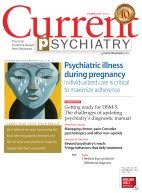Bernard Friedland, BChD, MSc, JD
Assistant professor of oral medicine, infection, and immunity, Harvard School of Dental Medicine, Boston, MA
Theo C. Manschreck, MD, MPH
Professor of psychiatry, Harvard Medical School, Boston, MA
Oral habits such as bruxism—compulsive grinding or clenching of the teeth—can be a manifestation of obsessive-compulsive disorder (OCD) and other anxiety disorders. Bruxism also may be a side effect of selective serotonin reuptake inhibitors (SSRIs) used to treat OCD and depression. Other oral conditions can complicate treatment of these disorders.
Potentially serious sequelae of bruxism and similar behaviors include:
wearing down of teeth (more common)
necrosis of the pulpal tissues that results in non-vital teeth (less common).
The following case underlines the need for early referral to a dentist and close follow-up for patients who have tooth-related behaviors or are taking medications associated with a risk for such behaviors.
Read full text (free access)
Comment on this article
Email the editor


Yes Sir, Good post and most importantly descriptive and informative for those how looking something useful about bruxism.
ReplyDeleteCommon treatments for teeth grinding range from the psychological to the preventative. Many believe that stress management will reduce the instances of teeth grinding. Dentists will often recommend using a mouth guard when sleeping to protect the teeth.
ReplyDeleteDentist India
thanks!
ReplyDelete